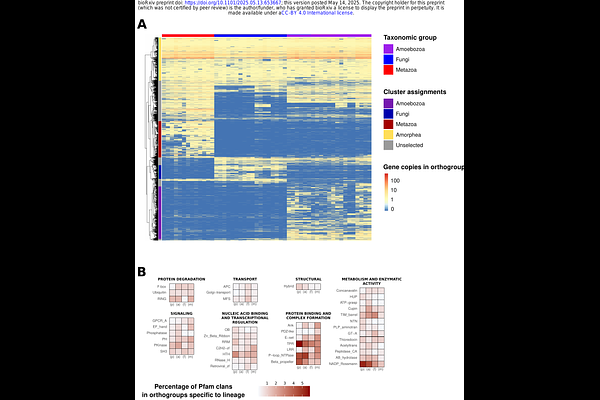The evolution of gene functional repertoire in Amorphea: Divergent strategies across Amoebozoa, Fungi, and Metazoa.

The evolution of gene functional repertoire in Amorphea: Divergent strategies across Amoebozoa, Fungi, and Metazoa.
Galvez-Morante, A.; Berney, C.; Richter, D. J.
AbstractMetazoa and Fungi have been extensively studied to reconstruct the trajectory of Opisthokont evolution. Their sister group, Amoebozoa, provides additional potential to generate valuable insights into the origins of Opisthokont lineages. Amoebozoa represent a diverse group of amoeboid organisms, which have adapted to a wide range of environments and ecological niches. Studying Amoebozoa not only helps to illuminate Opisthokont evolution but also reveals the mechanisms that have driven their ecological success. Here we report the discovery of Apostamoeba explorator strain BEAP0066, representing a novel lineage within Amoebozoa with intriguing behaviors like the \"double-amoeba\", a behavior characterized by the bipolarization of a cell into two poles that coexist and act as two semi-independent cells; and the \"colonizing rings\", the generation of a front of amoebae advancing together and grazing on bacterial mats. By analyzing the gene content of A. explorator and diverse amoebozoans with ancestral gene content reconstructions, correspondence analyses of Clusters of Orthologous Groups (COG) category composition and Pfam clan clustering, we revealed distinct evolutionary trajectories for Amoebozoa, Metazoa, and Fungi. Amoebozoa retained an ancestral Amorphea-like state, characterized by an enrichment of genes related to motility, phagocytosis, and environmental adaptability; while Metazoa specialized in multicellularity-related genes and Fungi in metabolism and transport. These findings suggest that retention of gene function composition, rather than gene loss, played a key role in shaping Amoebozoa evolution.